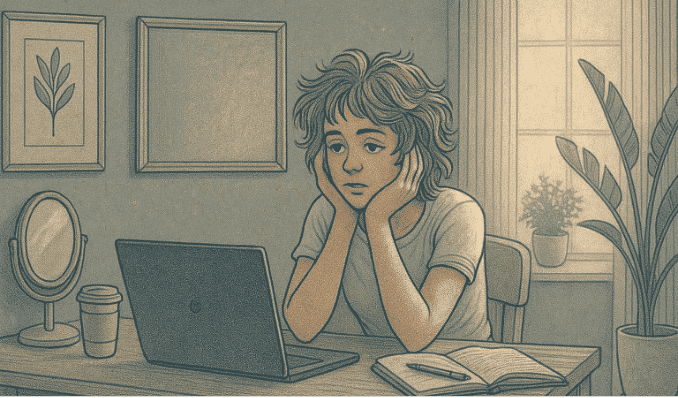Key Takeaways
- Healing is possible without therapy, though it may take time. In some cases, professional support is helpful to feel fully safe, connected, and whole again.
- Trauma affects both body and mind. By calming our nervous system through grounding and regulation, we begin to release stored stress and rebuild a sense of safety.
- The brain can rewire after trauma. With consistent self-care, mindful awareness, and supportive practices, emotional balance and clarity gradually return.
- Setbacks don’t mean failure. Healing moves in waves, and even when we revisit pain, each cycle brings deeper resilience and understanding.
- At A Mission for Michael (AMFM), we offer compassionate, evidence-based care for trauma and mental health challenges. Our personalized programs combine clinical expertise with human connection, helping you heal safely and completely.
Yes, You Can Heal from Trauma Without Therapy
Yes, you can heal from trauma without therapy. While professional help is often recommended, many people successfully go through their healing journey using alternative approaches.
The path to recovery looks different for everyone. Some individuals find that self-directed healing provides the autonomy and pace they need to process difficult experiences. Others find that cultural practices, community support, and body-based methods offer profound healing that complements or sometimes even replaces traditional therapy approaches.
Understanding the science behind trauma recovery empowers you to make informed choices about your healing journey. Let’s learn how trauma affects your body and mind, and the evidence-based strategies that can help you move forward, with or without a therapist’s guidance.
Founded in 2010, A Mission For Michael (AMFM) offers specialized mental health care across California, Minnesota, and Virginia. Our accredited facilities provide residential and outpatient programs, utilizing evidence-based therapies such as CBT, DBT, and EMDR.
Our dedicated team of licensed professionals ensures every client receives the best care possible, supported by accreditation from The Joint Commission. We are committed to safety and personalized treatment plans.
What Happens in Your Body During Trauma
Trauma isn’t only psychological—it’s a full-body experience that reshapes how your nervous system works. When you face threat or danger, your body activates survival responses like fight, flight, freeze, or fawn, releasing stress hormones such as cortisol and adrenaline. Normally, these systems calm once the threat passes. But in trauma, especially prolonged or repeated experiences, the nervous system can remain stuck in high alert, leading to chronic pain, digestive issues, and sleep problems.
How Your Brain Processes Trauma
Trauma also changes how your brain functions. The prefrontal cortex (responsible for logic and reasoning) quiets down, while the amygdala (your alarm center) goes into overdrive. This imbalance makes traumatic memories feel fragmented or intrusive, explaining flashbacks, nightmares, and emotional triggers. Healing involves helping the brain reprocess these memories so they feel integrated, not overwhelming.

Trauma affects both the mind and body, listening to physical signals is crucial for recovery.
Why Some Trauma Gets “Stuck”
Not every painful event becomes lasting trauma. Factors like age, support systems, and severity influence your body’s ability to return to balance. When processing is interrupted, such as being unable to fight, flee, or find safety, the experience can linger in your system. The good news: your body is naturally wired to complete these responses and move toward healing.
Physical Signs Your Body Is Holding Trauma
Your body often tells the story before your mind does. Common signs include:
- Chronic muscle tension (especially in the neck, jaw, or hips)
- Digestive or sleep disturbances
- Feeling constantly “on edge”
- Unexplained or shifting pain
- Numbness or shallow breathing
These sensations aren’t just symptoms because they’re messages from your body. Listening to them and responding with awareness is a key step toward recovery, whether through self-healing practices or therapy.
7 Self-Healing Practices That Actually Work
Healing from trauma doesn’t always require a therapist’s office. Research shows that certain self-directed practices can calm your nervous system, help process painful experiences, and build long-term resilience. These techniques work best when gently woven into daily life. Many also come from ancient healing traditions, now validated by modern neuroscience and psychology.
1. Body-Based Techniques
Because trauma is stored in the body, somatic (body-focused) practices help release tension and restore regulation. Try gentle shaking or tremoring (as animals do after stress), progressive muscle relaxation, or slow body scanning to notice and release sensations. Structured methods like TRE (Tension and Trauma Releasing Exercises) offer guided ways to complete interrupted stress responses. Over time, these practices help your body shift from survival mode to safety.
2. Daily Rituals for Safety
Trauma often disrupts your sense of predictability. Small daily rituals tell your body it’s safe again. Create morning or evening routines such as mindful stretching, lighting a candle, journaling, or simply taking five deep breaths while feeling your feet on the ground. The goal isn’t perfection but repetition, showing your nervous system that calm is possible.
3. Journaling for Emotional Processing
Writing can help organize and integrate fragmented memories. Expressive journaling for 15–20 minutes a few times a week has been shown to reduce trauma symptoms and improve mood. Try perspective writing (seeing the event through another lens), letters from your future self, or gratitude and resource journaling. Putting emotions into words helps your brain make sense of what happened, instead of reliving it.
4. Mindful Movement
Movement brings the body back into balance. Practices like yoga, tai chi, qigong, or mindful walking help discharge stuck energy and release stored stress. Focus on gentle, sensory awareness, how your breath feels, where your muscles soften, and how movement shifts your energy. Even short sessions can regulate your nervous system and restore inner connection.
5. Supportive Connections
Healing doesn’t mean doing it alone. Connection accelerates recovery. Trusted friends, family, or peer support groups can provide the empathy and validation that therapy often offers. Choose people who can listen without judgment and respect your boundaries. Even one supportive relationship can make a powerful difference.
6. Time in Nature
Spending time outdoors naturally soothes the body. Studies show that 20 minutes in nature can lower cortisol and activate your parasympathetic nervous system, the part responsible for rest and recovery. Walk barefoot on grass, sit by a tree, or simply watch the sky. Engage your senses to draw your awareness into the present moment, away from cycles of rumination.
7. Practicing Self-Compassion
After trauma, self-blame and shame can linger. Self-compassion helps counter these feelings, building inner safety and acceptance. Try placing a hand on your heart while offering kind words to yourself, writing a letter of understanding, or using the “compassionate friend” approach, speaking to yourself the way you would to someone you love. With practice, this softens your inner dialogue and fosters genuine healing.

Consistent daily rituals help the body and mind feel safe and grounded.
How to Know If Self-Healing Is Working
Healing from trauma rarely follows a straight line. Progress often comes in spirals—you may revisit similar triggers, but each time with more resilience and resources. Because of this non-linear pattern, it can be hard to notice subtle improvements.
Instead of expecting complete symptom elimination, look for gradual shifts in how you respond to triggers, manage stress, and relate to yourself. Keeping a simple journal or tracking system can help you recognize patterns that might otherwise go unnoticed.
Signs of Progress
Healing often shows up in small but meaningful ways:
- Recovering more quickly after being triggered
- Reduced intensity of trauma responses
- Physical improvements like better sleep, less tension, or fewer stress-related issues
- Feeling more present in your body rather than numb or disconnected
- Setting healthier boundaries and improving relationships
- Greater emotional flexibility and capacity for joy
- Traumatic memories feeling less vivid or overwhelming
- More compassionate inner dialogue
Setbacks Are Normal
Setbacks are part of the process, not failure. You might notice heightened symptoms, new triggers, or intense emotions as deeper trauma layers surface. When this happens, return to basics: gentle movement, rest, hydration, and connecting with supportive people. Simplify your practices temporarily rather than abandoning them. Healing happens in waves, and intensity is often followed by integration.
The Timeline of Healing
Everyone’s journey differs, influenced by trauma severity, duration, and available resources. Subtle shifts often appear within weeks, noticeable changes in months, and deeper transformation over years. Each small step builds momentum, making later stages feel more natural and integrated.
When Self-Healing Isn’t Enough
While self-directed practices can be highly effective, there are times when professional help is essential. Seeking therapy doesn’t mean you’ve failed—it’s simply recognizing that some stages of healing benefit from additional guidance. The most empowered approach often combines self-healing with targeted professional support.
Red Flags That Indicate Professional Help
Certain trauma symptoms signal that it’s time to reach out:
- Persistent suicidal thoughts or self-harm urges
- Dissociative episodes or loss of awareness
- Inability to maintain basic self-care
- Flashbacks or trauma responses that disrupt daily life
- Relationships suffering due to unresolved trauma
These signs are an invitation to safety and deeper healing. Professional support can provide structure, validation, and tools that self-healing alone may not fully address.
Combining self-healing with professional support creates a balanced, flexible path to recovery, allowing you to benefit from both personal practices and expert guidance.
A Mission for Michael: Personalized, Compassionate Mental Health Care

Combining self-healing practices with expert guidance provides a balanced path to recovery.
At A Mission for Michael (AMFM), we provide adult mental health treatment through residential programs, partial hospitalization (PHP), intensive outpatient (IOP), and virtual services. We specialize in complex psychiatric conditions, including depression, anxiety, PTSD, bipolar disorder, and schizophrenia, offering care tailored to each individual’s unique needs.
Why Choose Us
- Comprehensive, Evidence-Based Therapies: We provide CBT, EMDR, ACT, DBT, art, equine-assisted programs, and more.
- High Staff Support: With a 2:1 staff-to-client ratio, we ensure personalized attention and continuous monitoring.
- Holistic Wellness Approach: We integrate nutrition, physical health, emotional resilience, and experiential learning into every treatment plan.
- Comfortable, Home-Like Environments: We create spaces designed to foster safety, healing, and growth.
- Accessible Care: We accept most major insurance plans and provide guidance to make care affordable.
Our Philosophy
We see the person behind the diagnosis. Our treatment plans are flexible, evolving with each client’s progress. We emphasize compassion, connection, and world-class expertise, combining therapy, community engagement, and practical life skills to foster resilience and lasting transformation.
Locations & Access
We are available in California, Minnesota, Virginia, and Washington State, with telehealth options to provide flexible care. Our team helps process insurance, create tailored treatment plans, and ensure a smooth, supportive admission process.
Frequently Asked Questions (FAQs)
How long does it take to heal from trauma without therapy?
Healing timelines vary by trauma severity, duration, age, support, and life stressors. Subtle improvements may appear in weeks, noticeable shifts in 3–6 months, and deeper transformation over 1–3 years. Progress is gradual, not tied to a fixed deadline.
Can certain types of trauma only be healed with professional help?
No trauma type absolutely requires therapy, though complex or prolonged trauma, severe dissociation, or betrayal may benefit from guidance. Many still successfully use self-healing when supported, informed, and able to maintain basic functioning. Individual circumstances matter most.
Is it normal to feel worse before feeling better during self-healing?
Yes, temporary symptom increases are common, reflecting your system processing suppressed material. Known as a “healing crisis,” it usually resolves. Persistent, severe, or disruptive symptoms, including suicidal thoughts, indicate it’s wise to seek professional support.
Can trauma be completely healed, or will I always carry it?
Healing doesn’t erase trauma but integrates it so it no longer controls life. Occasional triggers may occur, but responses become manageable. Over time, processed trauma often fosters resilience, wisdom, and compassion, rather than defining your identity.
How do I know if my trauma is “severe enough” to need therapy?
Severity is how much your experiences affect daily life. If trauma disrupts your relationships, work, or self-care, professional guidance can make recovery smoother and safer.At A Mission for Michael (AMFM), we specialize in helping individuals heal trauma with personalized, compassionate care that supports healing at every stage, no matter if you’re beginning to learn about recovery or ready for deeper therapeutic work.












